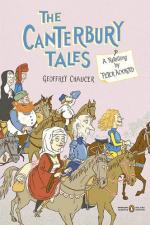|
This section contains 9,432 words (approx. 32 pages at 300 words per page) |

|
SOURCE: “Peter Ackroyd, Postmodern Play and Chatterton,” in Twentieth Century Literature, Vol. 38, No. 2, Summer, 1992, pp. 240-61.
In the following essay, Finney provides an overview of Ackroyd's theoretical development and postmodern perspective—particularly his view of history, language, and authenticity, as revealed in his biographical works and fiction, notably Chatterton.
Well known in Britain, less generally known in the United States, Peter Ackroyd is representative of a new breed of British novelists who can loosely be termed postmodernist. But, unlike their counterparts in the States, these British postmodernists do not necessarily cultivate radical experimentation, nor do they confine their appeal to an elite, mainly academic coterie. They are capable of producing best-sellers, such as Martin Amis’s Money. They produce works of fiction that are turned into movies, such as Angela Carter’s story “The Company of Wolves,” a rewriting of the traditional fairy story of Little Red Riding...
|
This section contains 9,432 words (approx. 32 pages at 300 words per page) |

|


